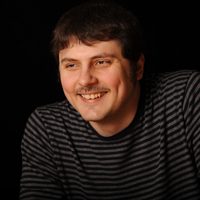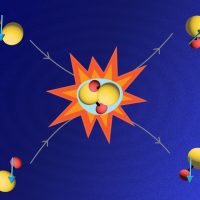Biography:
Timur Tscherbul graduated from Moscow State University, Russia in 2002 and obtained his PhD from the same university in 2005. As a graduate student, he worked on the theory of non-adiabatic and relativistic interactions in molecular collisions and chemical reactions. After defending his PhD, he joined the research group of Roman Krems at the University of British Columbia, where he was developing new approaches for rigorous quantum calculations of molecular collisions and chemical reactions in the presence of electromagnetic fields. In 2008, he became a postdoctoral fellow affiliated with the research groups of Alex Dalgarno at ITAMP and John Doyle at CUA. At present, his research is centered on developing new strategies for controlling complex atomic and molecular collisions at low temperatures with external electromagnetic fields.
- Y.-X. Liu, L. Zhu, J. Luke, M. Babin, T. Tscherbul, K. Ni, M. Gronowski, H. Ladjimi, M. Tomza, and J. Bohn. Hyperfine-to-rotational energy transfer in ultracold atom-molecule collisions. ArXiv 2024.
- J. Park, Y. Lu, A. Jamison, T. Tscherbul, and W. Ketterle. A Feshbach resonance in collisions between triplet ground state molecules. Nature, 614(5458), 2023.
- T. Tscherbul, Z. Pavlovic, H.R. Sadeghpour, and G.C. Groenenboom. Cold collisions of OH(2II) Molecules with He Atoms in External Fields. in press J. Phys. Chem. A 2009.
- T. Tscherbul, P. Zhang, and H.R. Sadeghpour. Collision-Induced spin Exchange of alkali-Metal Atoms with He: An Ab Initio Study. Phys. Rev. A, 79:062707, 2009.
- T. Tscherbul, G.C. Groenenboom, and R.V. Krems. Dynamics of OH(2II)-He Collisions In Combined Electric and Magnetic Fields. in press Faraday Discuss. 2009.
- T. Tscherbul, Y. V. Suleimanov, V. Aquilanti, and R.V. Krems. Magnetic field modification of ultracold molecule-molecule collisions. New J. Phys., 11:055021, 2009.
- W. Campbell, T. Tscherbul, H. Lu, E. Tsikata, J. Doyle, and R.V. Krems. Mechanism of Collisional Spin Relaxation in S Molecules. Phys. Rev. Lett., 102:013003, 2009.
- T. Tscherbul, P. Zhang, N. Brahms, Y. Au, J. Doyle, and H.R. Sadeghpour. Collision-induced spin depolarization of alkali-metal atoms in cold He gas. Phys. Rev. A, 78:060703(R), 2008.
- T. Tscherbul. Differential Scattering of Cold Molecules in Superimposed Electric and Magnetic fields. J. Chem. Phys., 128:244305, 2008.
- T. Tscherbul, S. Singh, and K. W. Madison. Feshbach Resonances in Ultracold 85Rb-87 and 6li-87Rb Mixtures. Phys. Rev. A, 78:022710, 2008.
- T. Tscherbul and R.V. Krems. Quantum Theory of Chemical Reactions in the Presence of Electromagnetic Fields. J. Chem. Phys., 129:034112, 2008.

